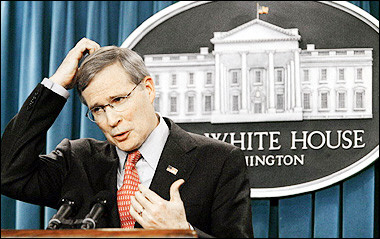|
White House declines to totally rule out torture
(AFP)
Updated: 2005-11-14 08:34
In an important clarification of US President George W. Bush's earlier
statement, a top White House official refused to unequivocally rule out the use
of torture, arguing the US administration was duty-bound to protect Americans
from terrorist attack.
The comment, by US national security adviser Stephen Hadley, came amid heated
national debate about whether the CIA and other US intelligence agencies should
be authorized to use what is being referred to as "enhanced interrogation
techniques" to extract from terror suspects information that may help prevent
future assaults.
The US Senate voted 90-9 early last month to attach an amendment authored by
Republican Senator John McCain to a defense spending bill that would prohibit
"cruel, inhuman or degrading" treatment of detainees in US custody. But the
White House has threatened to veto the measure and has lobbied senators to have
the language removed or modified to allow an exemption for the Central
Intelligence Agency.

US President George
W. Bush's National Security Adviser Stephen Hadley speaks to the press 10
November, 2005, at the White House in Washington, DC.
[AFP/file] | During a trip to Panama earlier this month, Bush said that Americans "do not
torture."
However, appearing on CNN's "Late Edition" program, Hadley elaborated on the
policy, making clear the White House could envisage circumstances, in which the
broad pledge not to torture might not apply.
"The president has said that we are going to do whatever we do in accordance
with the law," the national security adviser said. "But... you see the dilemma.
What happens if on September 7th of 2001, we had gotten one of the hijackers and
based on information associated with that arrest, believed that within four
days, there's going to be a devastating attack on the United States?"
He insisted that it was "a difficult dilemma to know what to do in that
circumstance to both discharge our responsibility to protect the American people
from terrorist attack and follow the president's guidance of staying within the
confines of law."
The CIA is reported to be operating a network of covert prisons in eight
countries around the world, including Afghanistan, Thailand and several former
Soviet bloc nations in Eastern Europe, where terror suspects are questioned.
Republican Senator Kit Bond, a member of the Senate Intelligence Committee,
told Newsweek magazine that "enhanced interrogation techniques" had worked with
at least one captured high-level Al-Qaeda operative, Khalid Shaikh Mohammed, to
thwart an unspecified plot.
But officials have been mum about interrogation techniques used on other
detainees, drawing sharp criticism from members of the Senate.
A compromise with senators was in the works, Hadley assured, saying the White
House was holding consultations with them about the McCain amendment.
He offered no specifics about the administration's goals in these talks. But
McCain, who appeared on CBS's "Face the Nation" program, said White House
negotiators led by Vice President Richard Cheney were pushing to safeguard the
option of using the enhanced interrogation techniques in order to get
information from detainees in extraordinary circumstances.
The senator said he disagreed with that approach because he was worried about
the damage to the image of the United States.
"I hold no brief for the terrorists," he said. "But it's not about them. It's
about us. This battle we're in is about the things we stand for and believe in
and practice. And that is an observance of human rights, no matter how terrible
our adversaries may be."
Americans at large don't seem to have a clear-cut position on the use of
torture. The latest Newsweek opinion poll found that 58 percent of the public
would support torture to thwart a terrorist attack.
But the same survey showed that 51 percent of Americans believe it is rarely
or never justified, while 44 percent said torture is often or sometimes
justified to obtain important information.
|